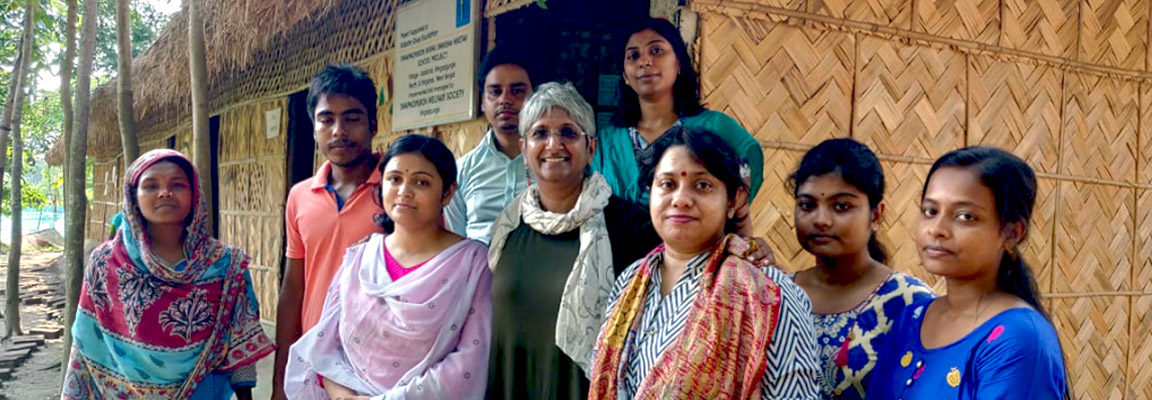


Date : Jun 19 , 2019 | Alumni
A year since she first came across the ILSS Leadership Program, Radha Arakkal looks back at “an interesting, emotional journey guided by some happy chances and some deliberate choices.”
I spent all of last week in West Bengal, amidst a bunch of committed teachers and social workers from Kolkata who run an English medium school for 120 children in Hingalganj, North 24 Parganas. They have very limited funds but that’s not to stop them from dreaming big. The Swapnopuron Welfare Society’s school now has up to Grade V and the team would like to extend to higher classes and get a CBSE affiliation. When that happens, it has the potential to transform a marginalised community in a remote part our country.
Spending time with the board members of the organisation and the bright, enthusiastic children at the school set me thinking about how I reached here, a world away from what I was used to doing for almost 25 years of my life: helping big multinational brands grow bigger. Until I reached a stage where I started asking myself about the point of it all. That question led me to quit my corporate job last year.
Serendipity
Having put in my papers and serving a long notice, I was on the quest for what to do next. That’s when my husband returned from the gym one rainy July day last year and said that Sangeeta (Menon, ILSS Cohort 1), who is a neighbour, was talking about something that would interest me. I had a long chat with her and soon found myself applying for the August 2018 edition of the ILSS Leadership Program. The essays that I wrote as part of the application process forced me to think about what I cared about. My interview with Anu Prasad (founder, ILSS) was like homecoming. This clinched it in my mind. This is what I wanted to explore.
Epiphany
The nine-day program itself was an excellent introduction to the social sector, curated to bring together the best speakers for the issues being discussed. So many wonderful people were doing such good work — it was inspiring and made me realise I needed to do my bit. It was also heartening that 16 others (we had a cohort of 17) shared the same intent. Chakshu Roy’s session on how civil society can engage with policymaking gave me an idea of how the skills I had honed over the years could be useful in the sector: I could take up research or advocacy or help brands with marketing strategy.
Action
A couple of months after I got back from the ILSS program, while still on my notice period, a project from Sattva Consulting landed on my table. Sattva was commissioned by the Gates Foundation and Nilekani Philanthropies to research everyday giving in India. They couldn’t afford my company’s services and I agreed to take on secondary research, as an independent consultant. Thus the last quarter of 2018 was spent thoroughly researching the sector and providing Sattva with the data they needed to put together their report. This gave me insight into funding for the sector and possibilities for the future.
Just as I was wrapping up this assignment, a friend who was coaching several small social entrepreneurs, introduced me to GAP (Global Action against Poverty, a wing of the Head Held High Foundation). I attended their annual conference, which takes place at the Sabarmati Ashram every February. The three-day event brings together 300-350 people from the sector, including funders, enablers, foundations, trusts, change leaders, and hundreds of change makers (NGOs/ grassroots workers).
Inspired by the great work I saw all around me, I took on mentoring a few NGOs as a change leader and helping them in any way I could. The four work on different causes and geographies: education in rural West Bengal (the NGO I visited recently: Swapnopuron Welfare Society), livelihoods for trafficked women and children in Khajuraho, eldercare in Telangana, and LGBT rights in rural Tamil Nadu. Working with them and learning about their day-to-day struggles is truly humbling. These people who have so little themselves, are working tirelessly to help others improve their lives. I have resolved to support them and bring them resources from the urban affluent. How else can we have a more equitable society?
Full Circle
One concern at the back of my mind was an income. That’s when Ritu Jain from my ILSS cohort, who was then COO at Teach for India, reached out for help with communications for the TFI brand. I took this up as a project and found that it’s hugely satisfying. I can bring my marketing strengths to play and make a real difference too. Furthermore, the TFI office is located close to home–a huge plus in Mumbai city.
So my journey has come full circle. Having travelled around the country trying to learn as much as I could, I found a niche right under my nose. And to keep myself grounded, I continue travelling to grassroots NGOs and taking up their causes back in Mumbai.
This past year has been an interesting, emotional journey, guided by some happy chances and some deliberate choices. There was always hope around the corner. Perhaps the universe was conspiring to make this happen for me? I am very grateful to ILSS for giving me the courage to embark on this journey and for the support thereafter. I think it is a great idea, whose time has come.
Date : Apr 5 , 2024
Date : Mar 28 , 2024
Date : Jan 25 , 2024
Date : Mar 22 , 2023
Date : Mar 15 , 2022
Date : Dec 8 , 2021
Date : Sep 2 , 2021
Date : Jun 19 , 2021
Date : Jun 5 , 2021